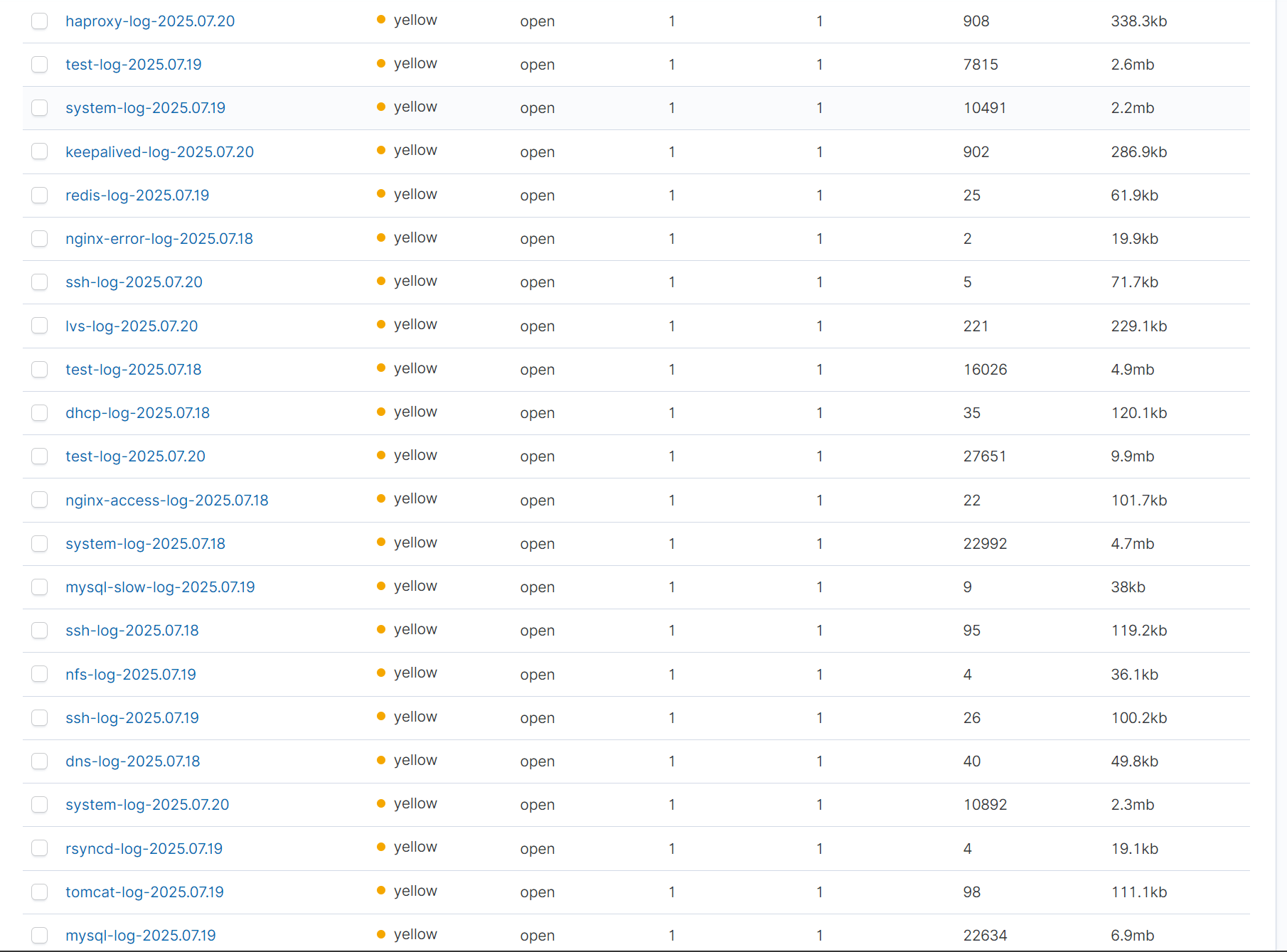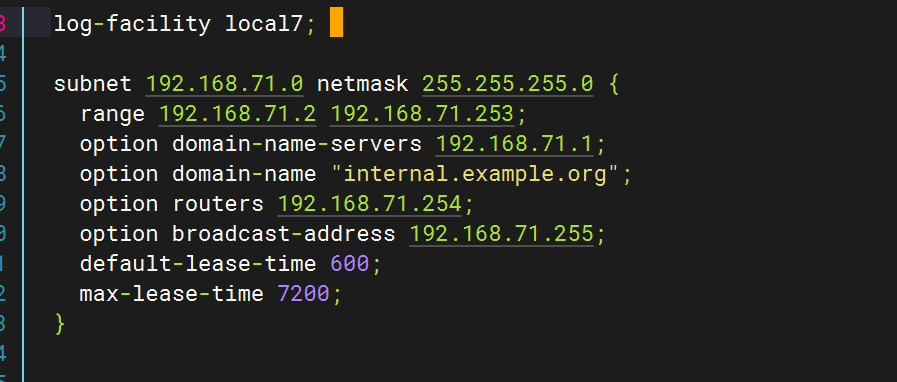目录
[编辑 配置logstash文件](#编辑 配置logstash文件)
一.环境准备
| 角色 | 主机名 | IP地址 |
|---|---|---|
| 图形展示 | kibana | 192.168.71.178 |
| 日志存储 | es | 192.168.71.179 |
| 日志收集分析 | lostash | 192.168.71.180 |
| 日志采集 | test | 192.168.71.181 |
试验机安装

分别安装elasticsearch,logstash,kibana,filebeat




优化logstash命令
ln -s /usr/share/logstash/bin/logstash /usr/local/bin/
修改文件配置
elasticsearch:

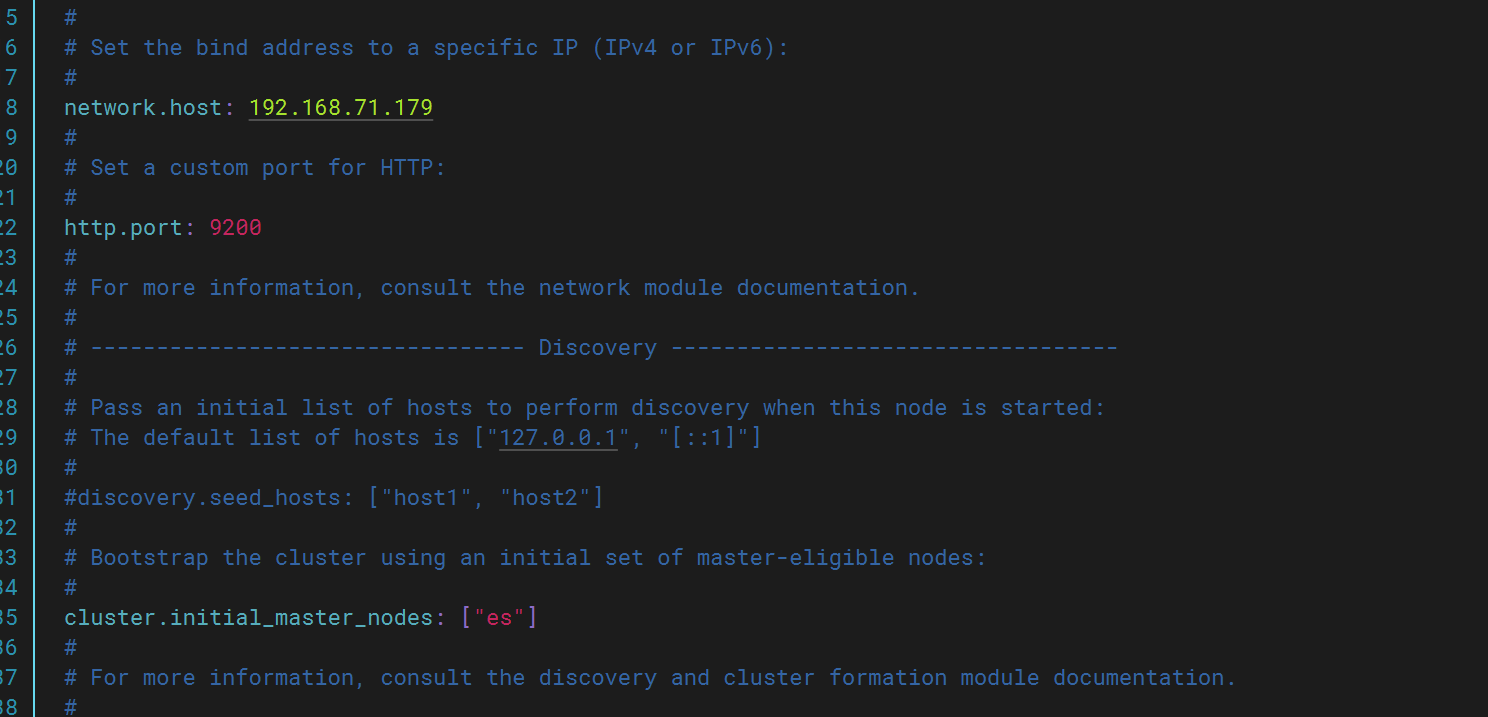
kibana:
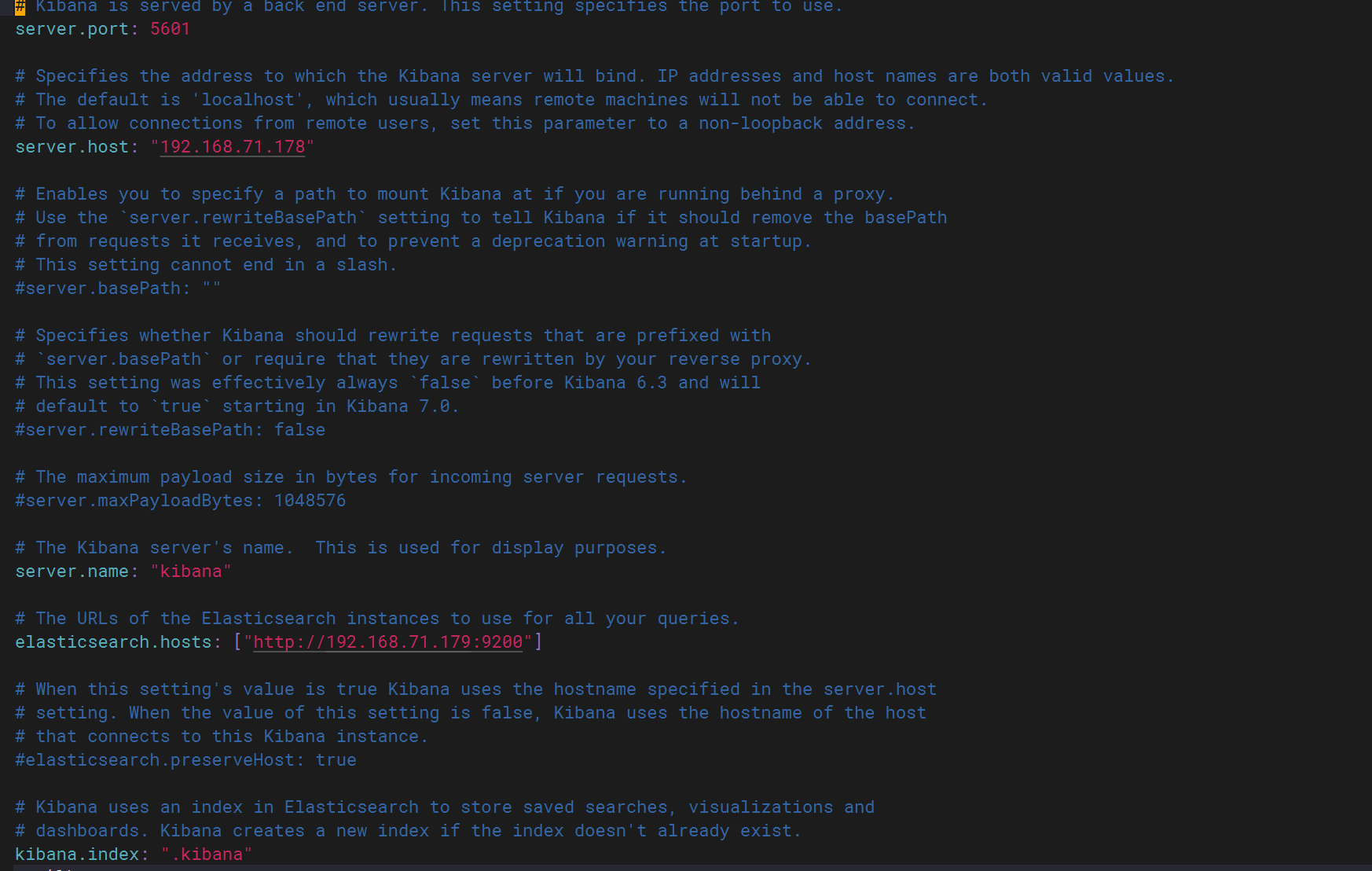

可以正常登录5601端口

编写pipline文件

初始文件内容
input {
file {
path => "/var/log/messages"
start_position => "beginning"
}
}
output {
elasticsearch {
hosts => ["http://192.168.71.179:9200"]
index => "system-log-%{+YYYY.MM.dd}"
}
stdout {
codec => rubydebug
}
}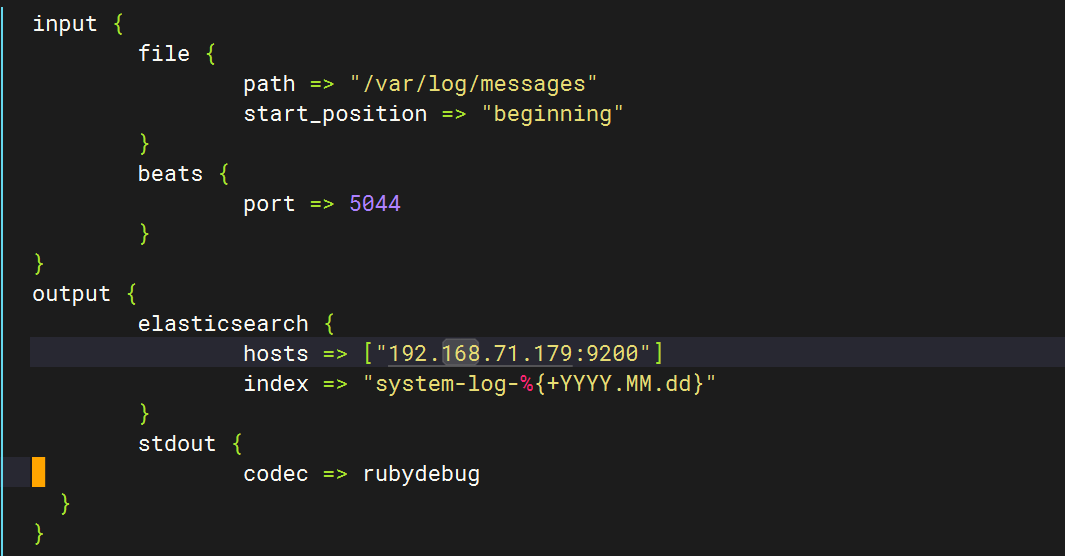
运行logstash获取日志,并在kibana查看

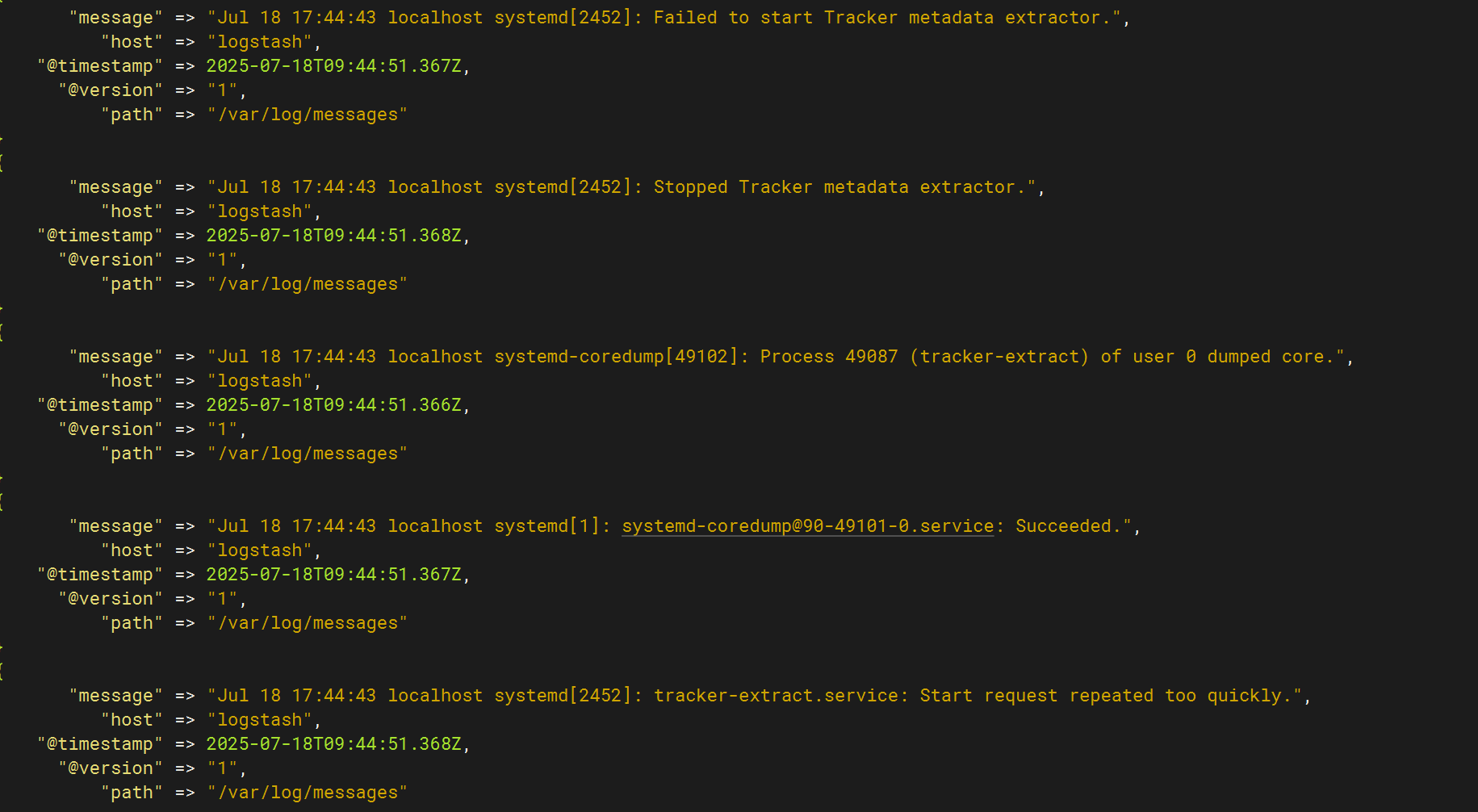

成功运行,并且成功获取日志
二.收集测试机(test)日志
配置pipline文件
新加一个端口(未使用的都可以)
input {
file {
path => "/var/log/messages"
start_position => "beginning"
}
beats {
port => 5044
}
}
filter {
if [host][name] {
mutate { add_field => { "hostname" => "%{[host][name]}" } }
}
else if [agent][hostname] {
mutate { add_field => { "hostname" => "%{[agent][hostname]}" } }
}
else {
mutate { add_field => { "hostname" => "%{host}" } }
}
}
output {
if [hostname] == "logstash" {
elasticsearch {
hosts => ["192.168.71.179:9200"]
index => "system-log-%{+YYYY.MM.dd}"
}
}
else if [hostname] == "test" {
elasticsearch {
hosts => ["192.168.71.179:9200"]
index => "test-log-%{+YYYY.MM.dd}"
}
}
stdout {
codec => rubydebug
}
}配置filebeat配置文件
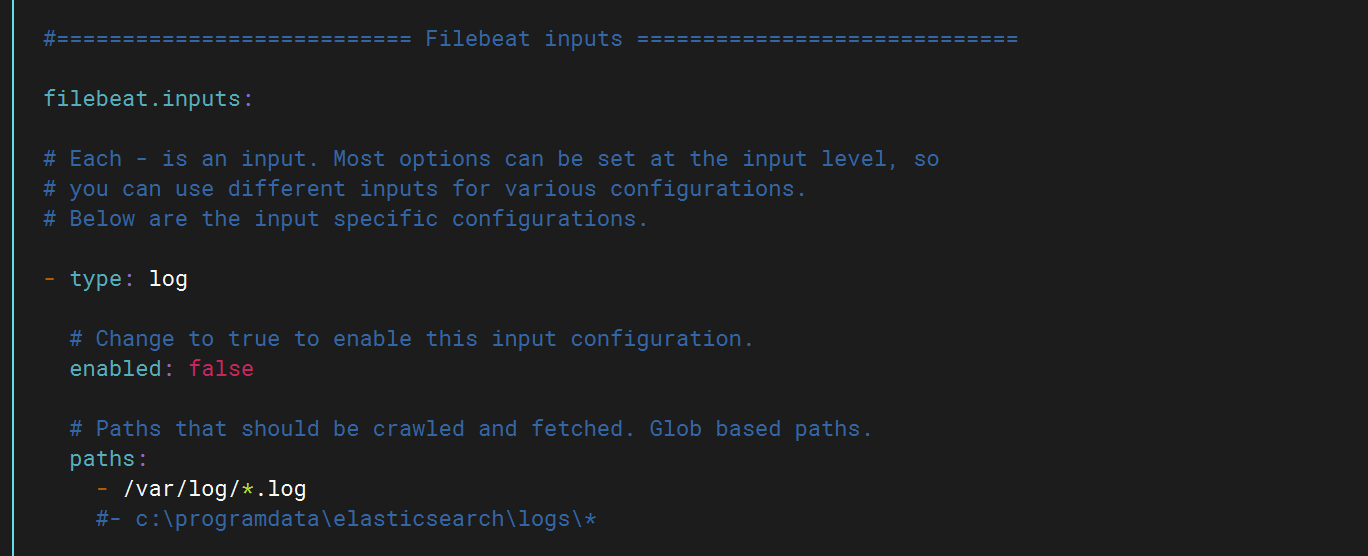
将false改为ture打开该功能,然后填写日志路径
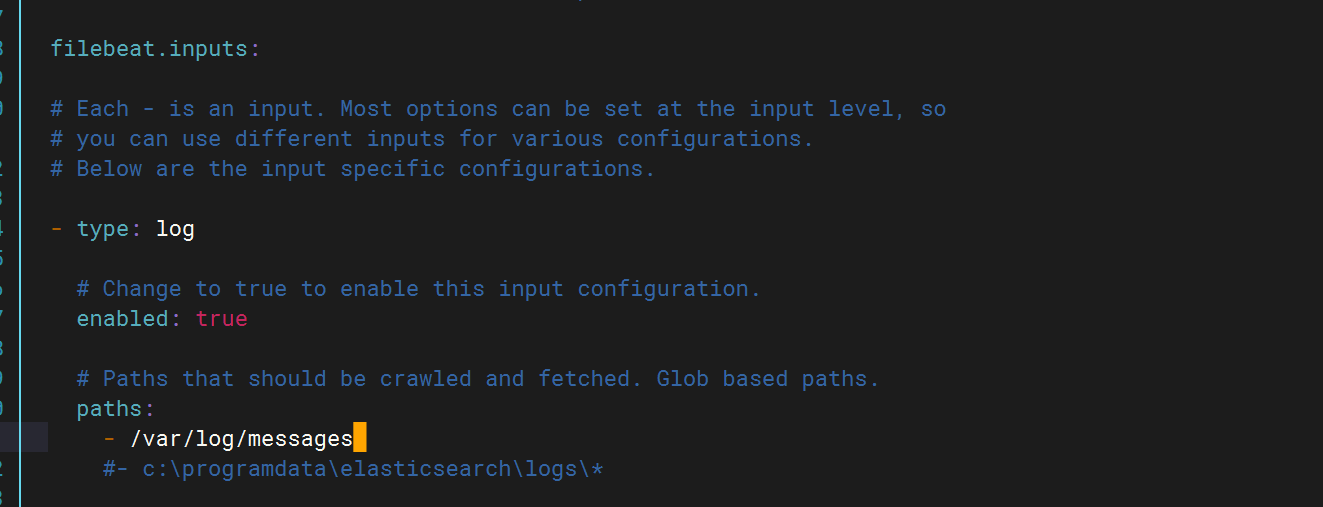
将ES注释掉并打开logstash

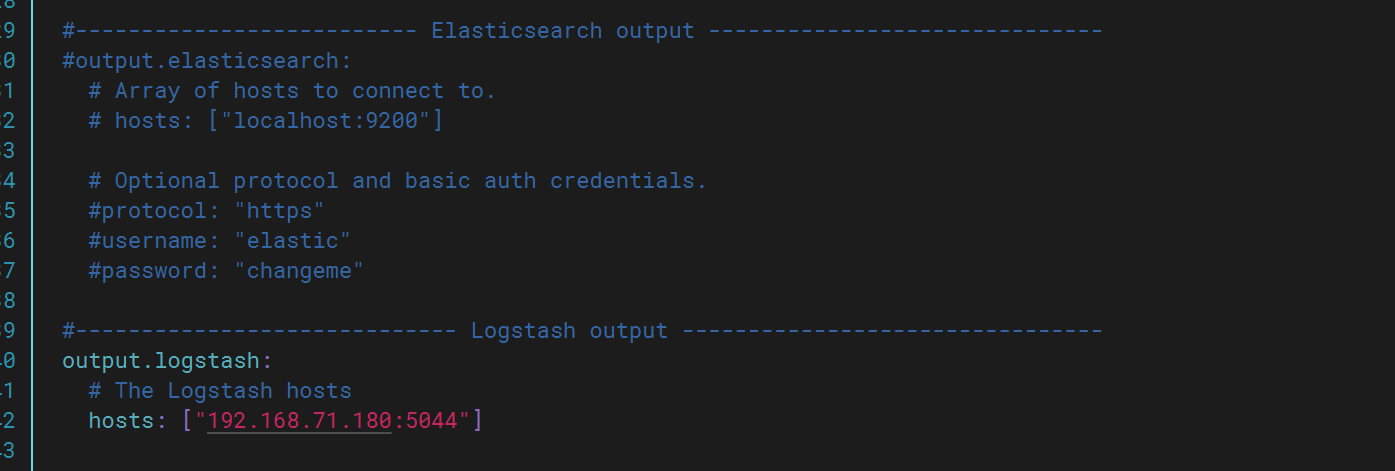
修改完成后启动logstash,此时再次查看kibana发现多出test上的日志文件。

三.收集测试机nginx日志
下载安装nginx

修改filebeat文件
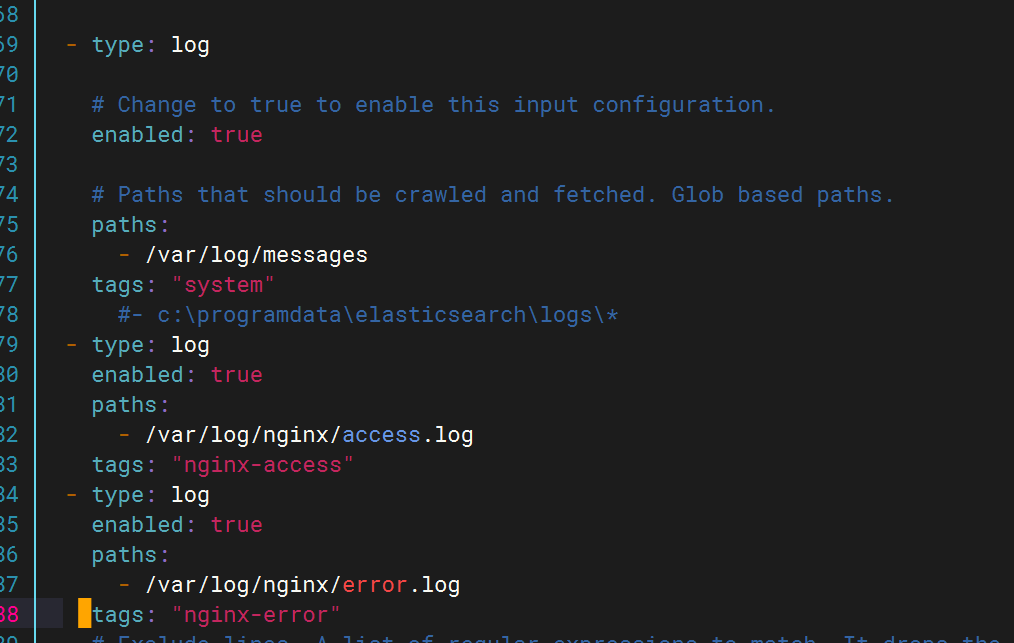
修改pipline文件
在test下新增如下内容
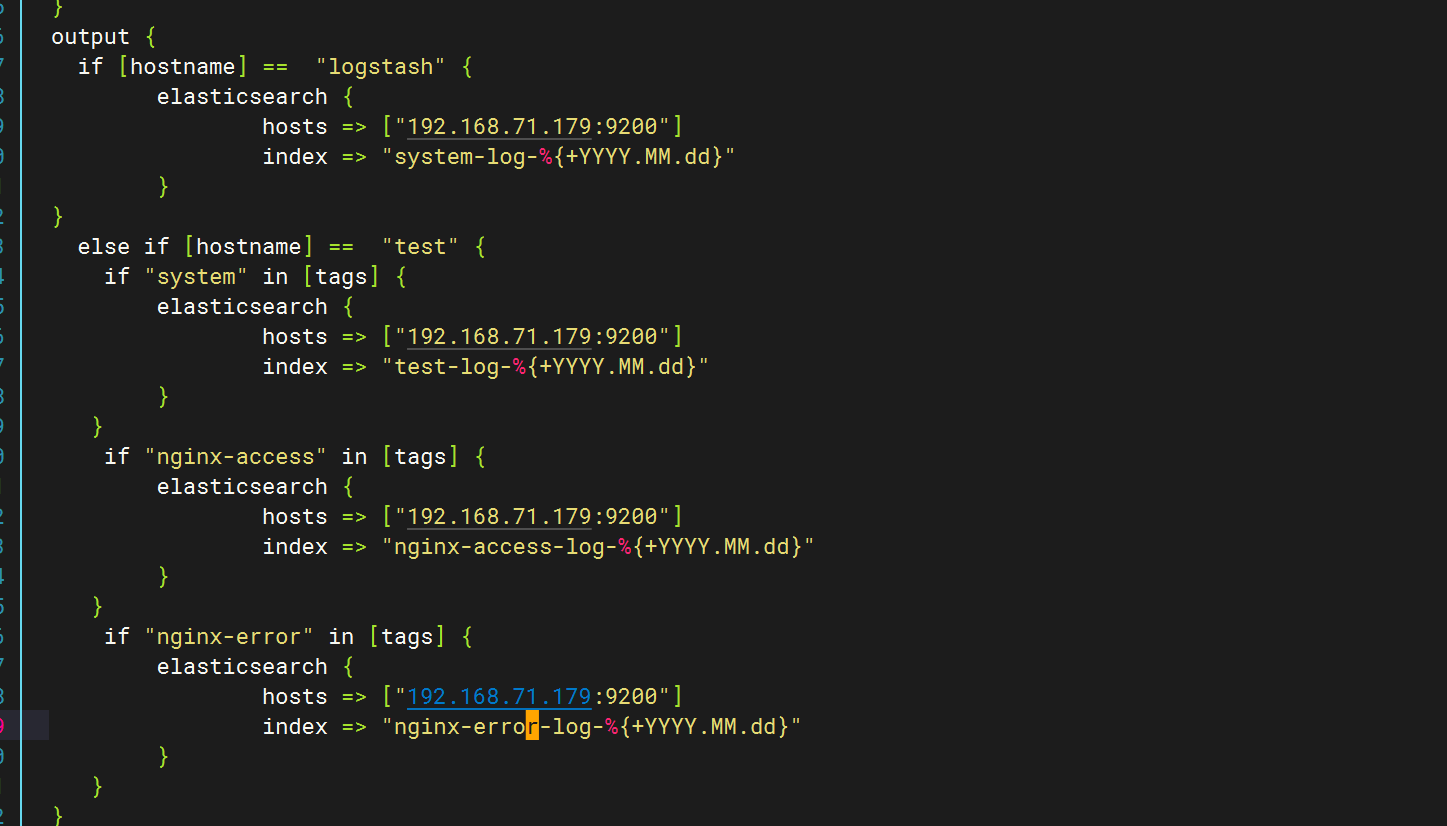
登录nginx(不改主页会有一个错误日志)

登录查看kibana,生成日志文件
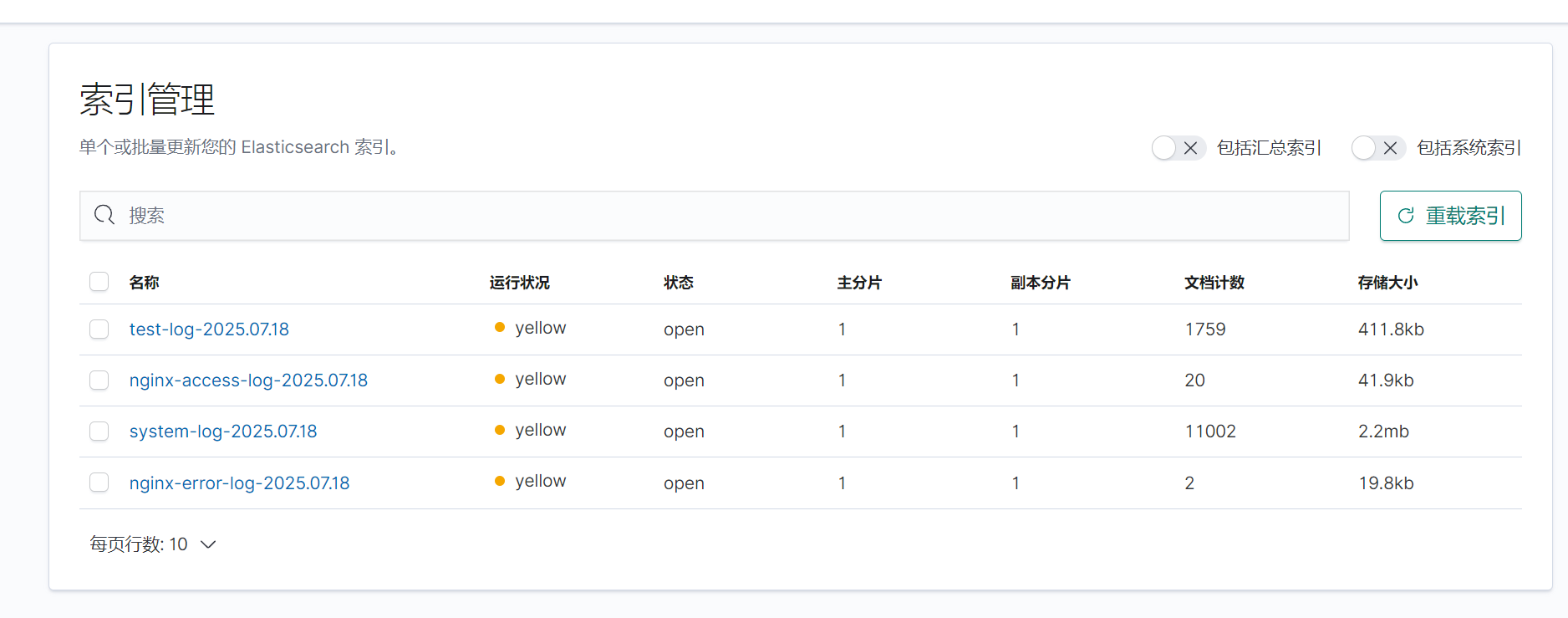
四.收集网络服务模块日志
1.DHCP
下载dhcp

将完整dhcpd.conf文件复制过来


修改配置文件
修改dhcp配置文件
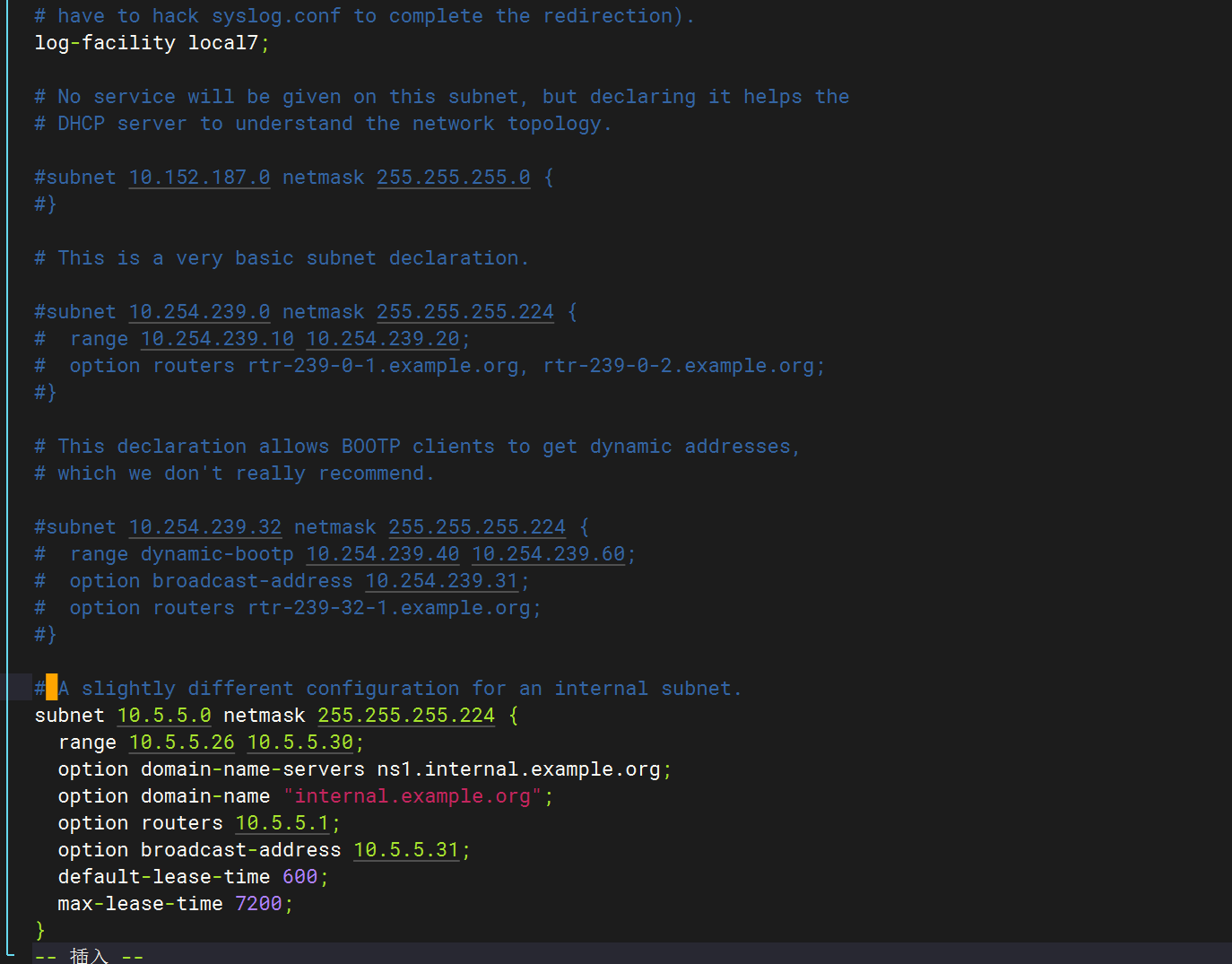
全部删除,只保留以下字段
修改/etc/rsyslog.conf,指向dhcpd.log(日志文件)

配置logstash文件
配置filebeat文件
重启应用查看kibana
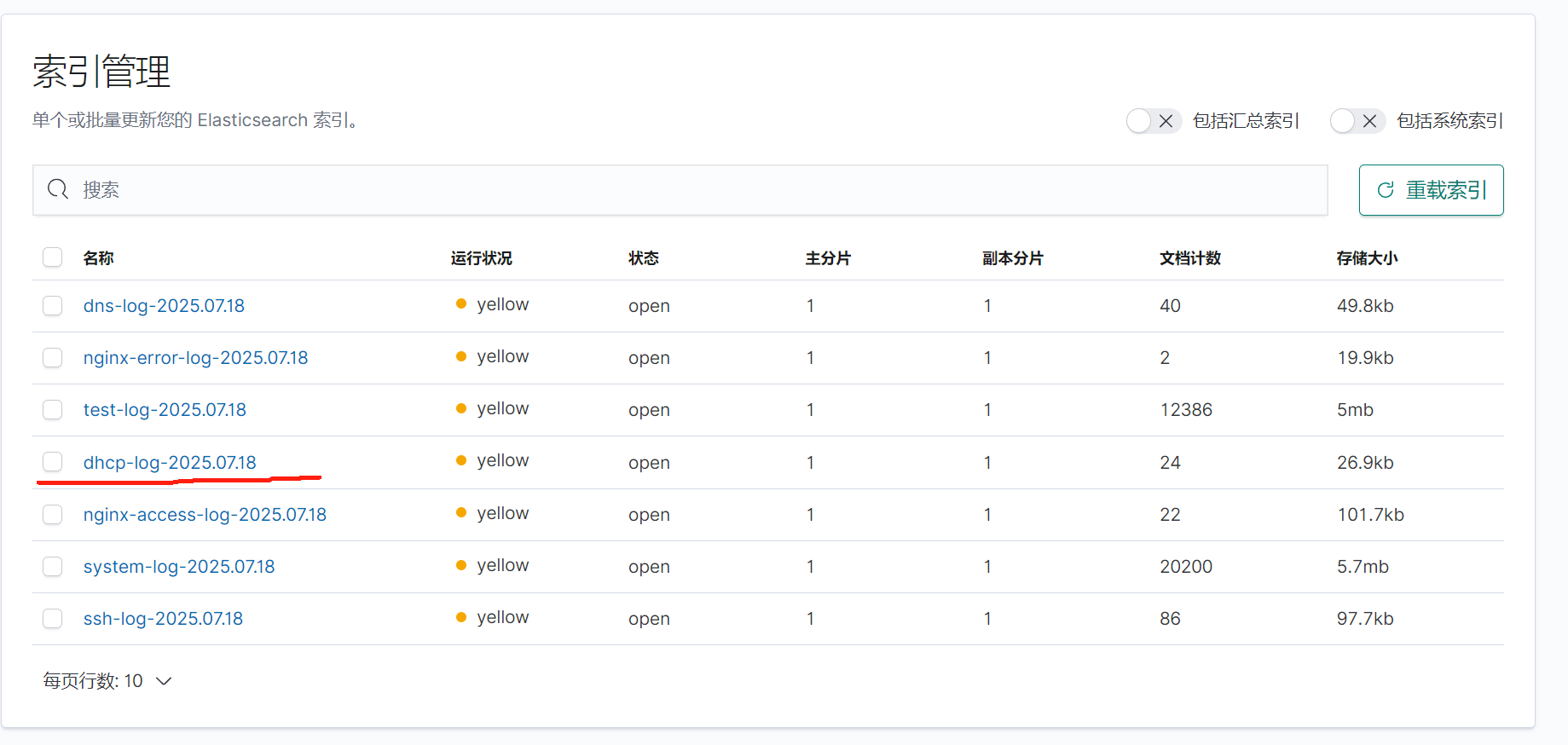
2.DNS
下载DNS(bind)

修改配置文件(/etc/named.conf)
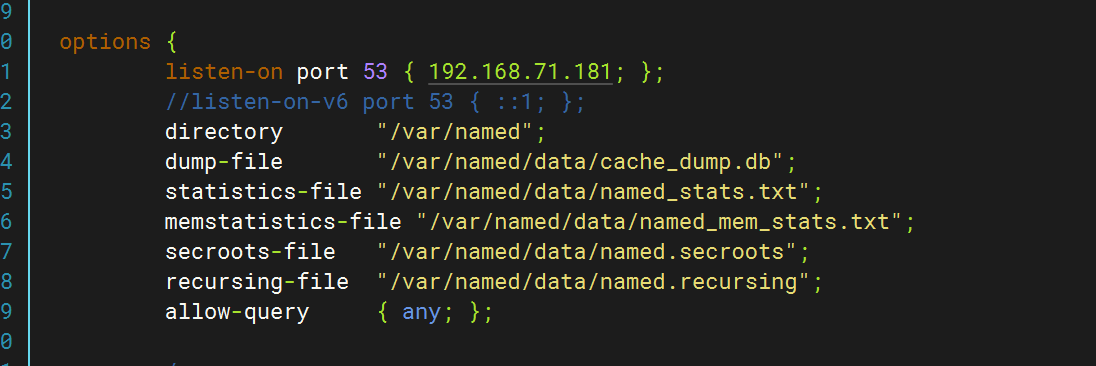
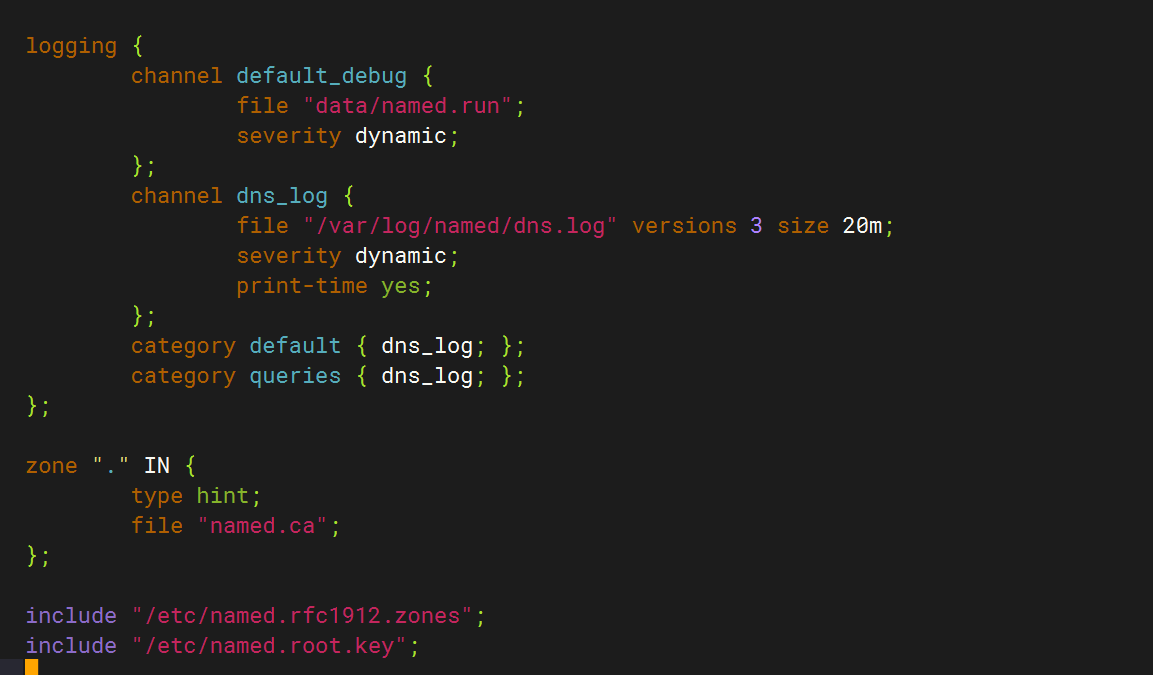
logging {
channel default_debug {
file "data/named.run";
severity dynamic;
};
channel dns_log {
file "/var/log/named/dns.log" versions 3 size 20m;
severity dynamic;
print-time yes;
};
category default { dns_log; };
category queries { dns_log; };
};创建日志目录并赋权
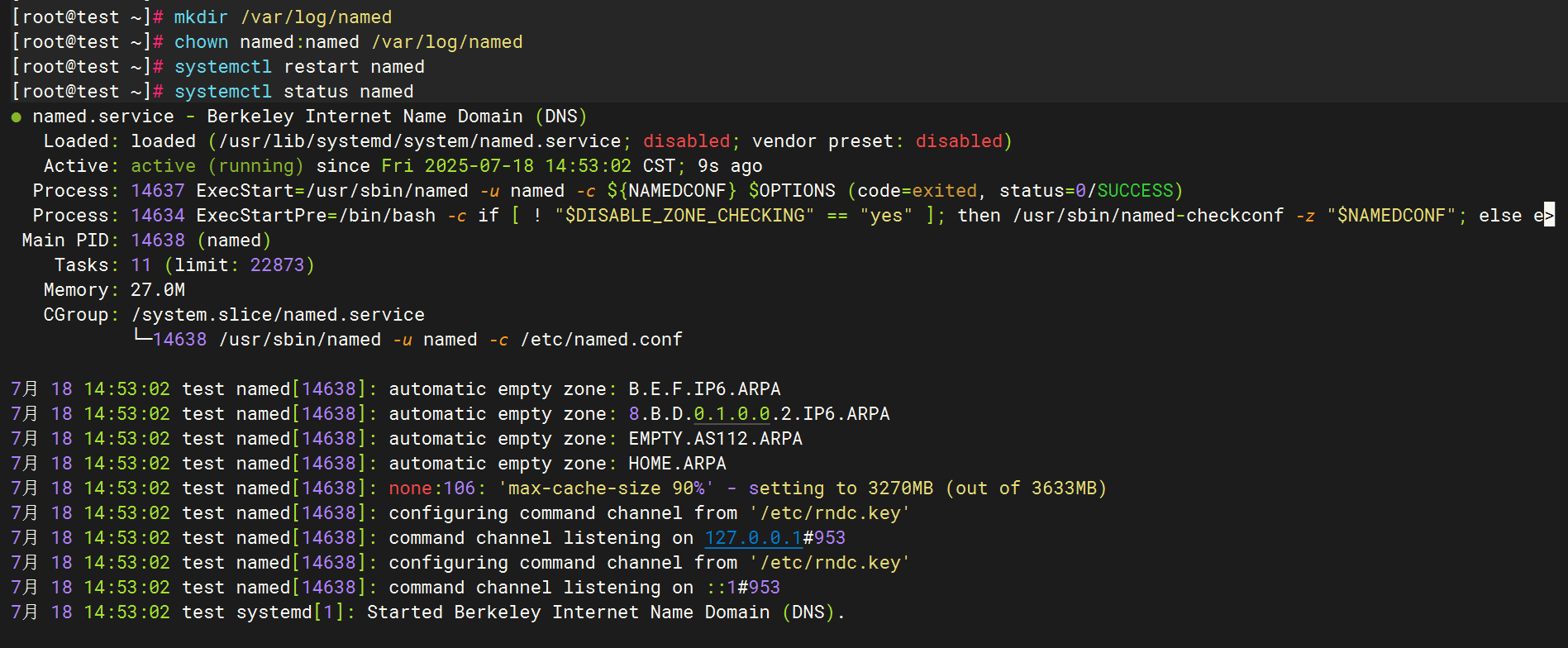 配置filebeat文件
配置filebeat文件
 配置logstash文件
配置logstash文件

全部启动后在kibana查看日志
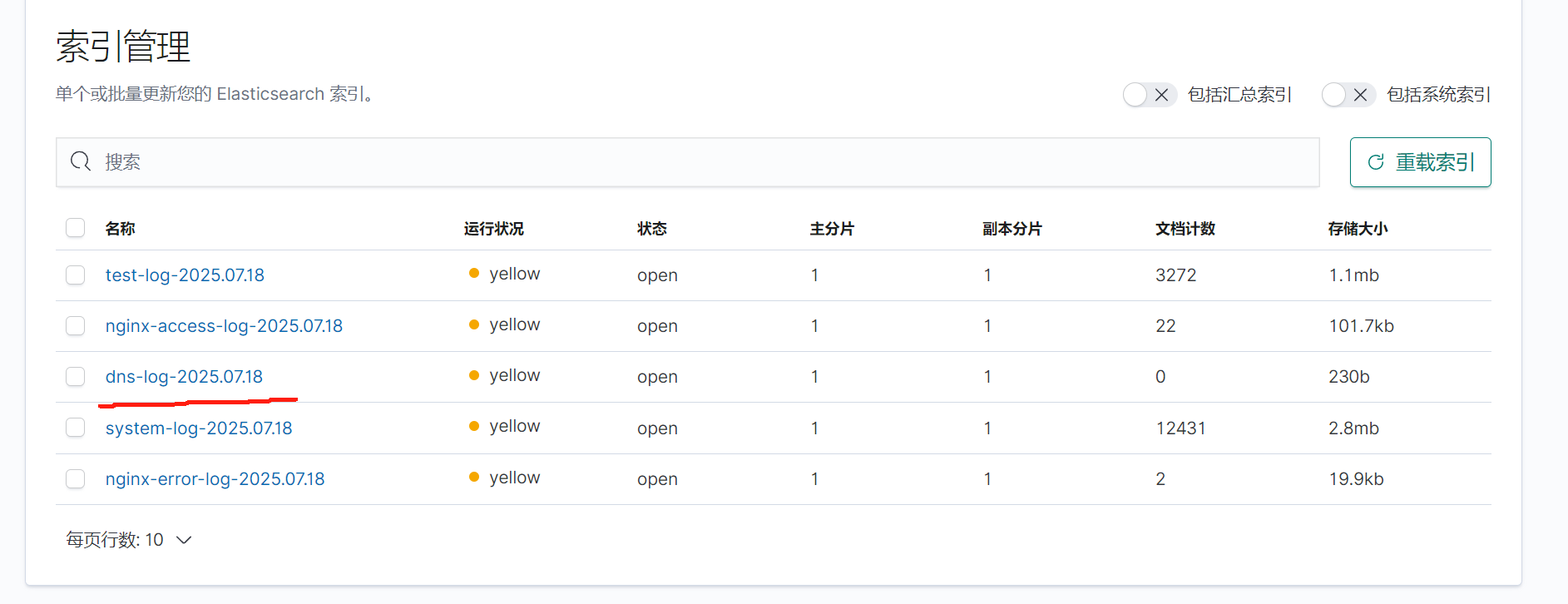

3.SSH
ssh的日志文件路径为/var/log/secure
配置文件
Filebeat配置
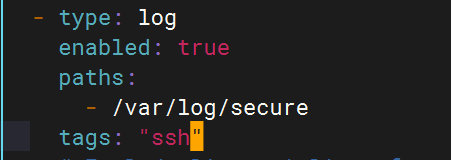
Logstash配置

重启应用

检查kibana
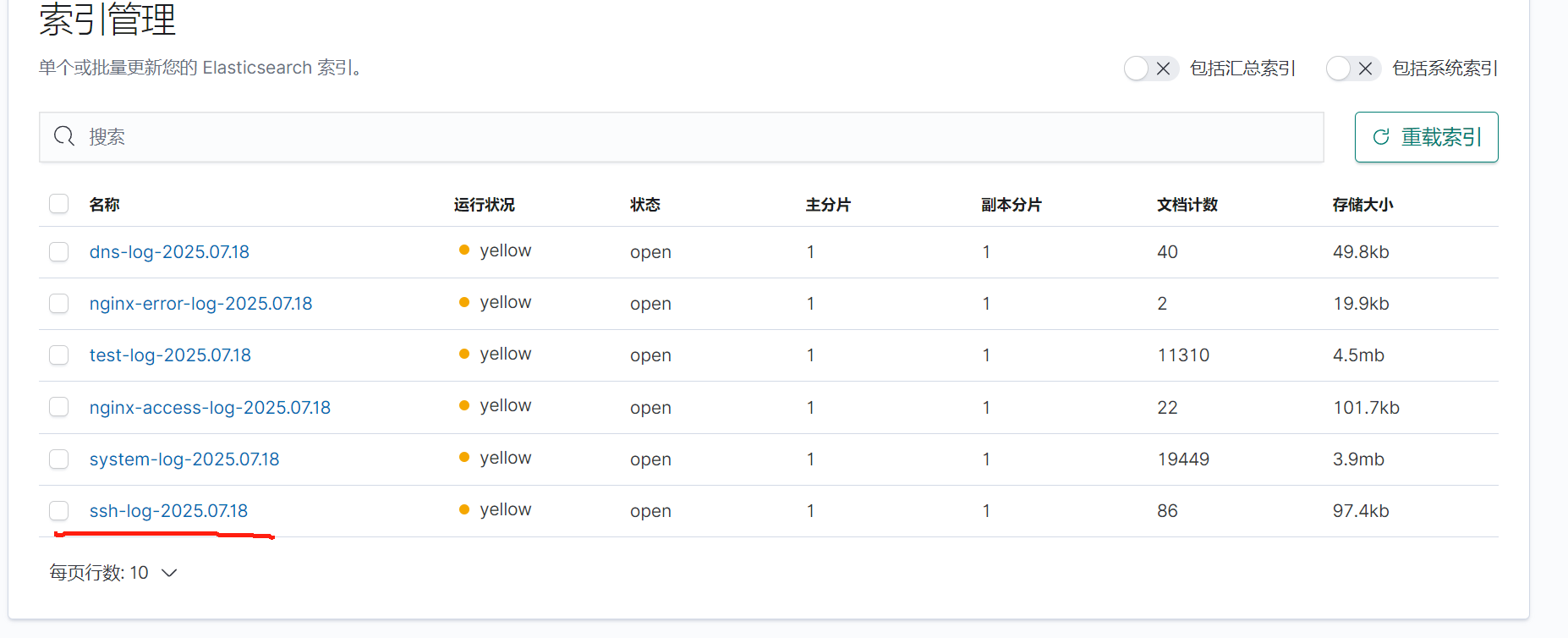
4.Rsync
配置rsync
下载rsync

创建服务配置文件
sudo tee /usr/lib/systemd/system/rsyncd.service <<'EOF'
[Unit]
Description=fast remote file copy program daemon
Documentation=man:rsyncd(8)
After=network.target
[Service]
EnvironmentFile=/etc/sysconfig/rsyncd
ExecStart=/usr/bin/rsync --daemon --no-detach $OPTIONS
[Install]
WantedBy=multi-user.target
EOF创建环境配置文件
sudo tee /etc/sysconfig/rsyncd <<'EOF'
# Options for rsync daemon
OPTIONS=""
EOF创建主配置文件
sudo tee /etc/rsyncd.conf <<'EOF'
# 最小化配置示例
uid = root
gid = root
use chroot = yes
max connections = 4
pid file = /var/run/rsyncd.pid
# 示例模块
[backup]
path = /tmp/backup
comment = Backup Area
read only = no
EOF创建日志文件并赋权:

启动服务

Filebeat配置

logstash配置

重启服务,使用rsync命令向目标主机传输文件以生成日志

在kibana上查看
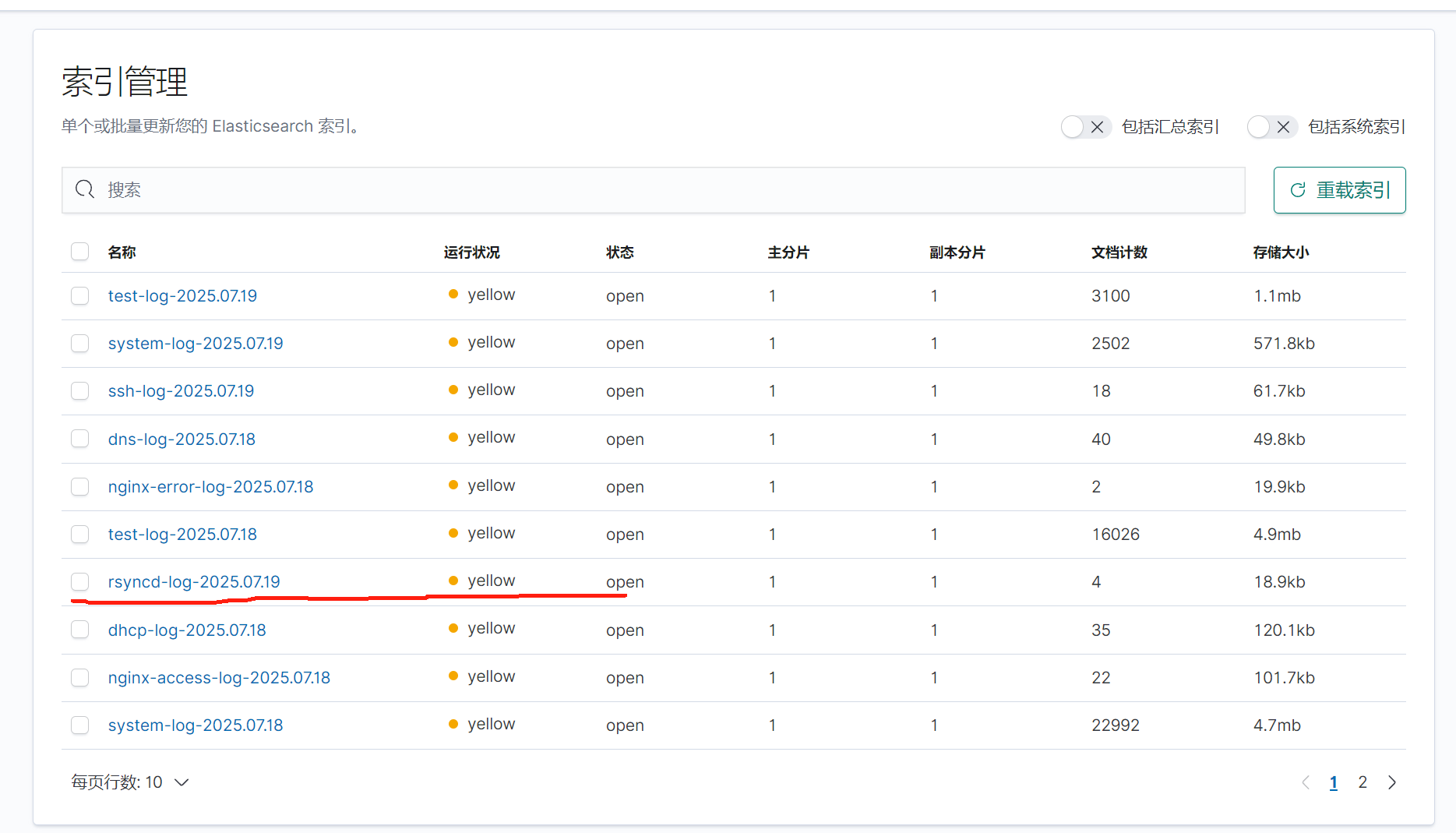
五.收集Tomcat服务日志
1.安装tomcat
解压安装包

Tomcat安装

优化启动和关闭命令

2.Tomcat启动验证

3.配置filebeat文件

4.配置logstash文件

5.重启服务查看kibana
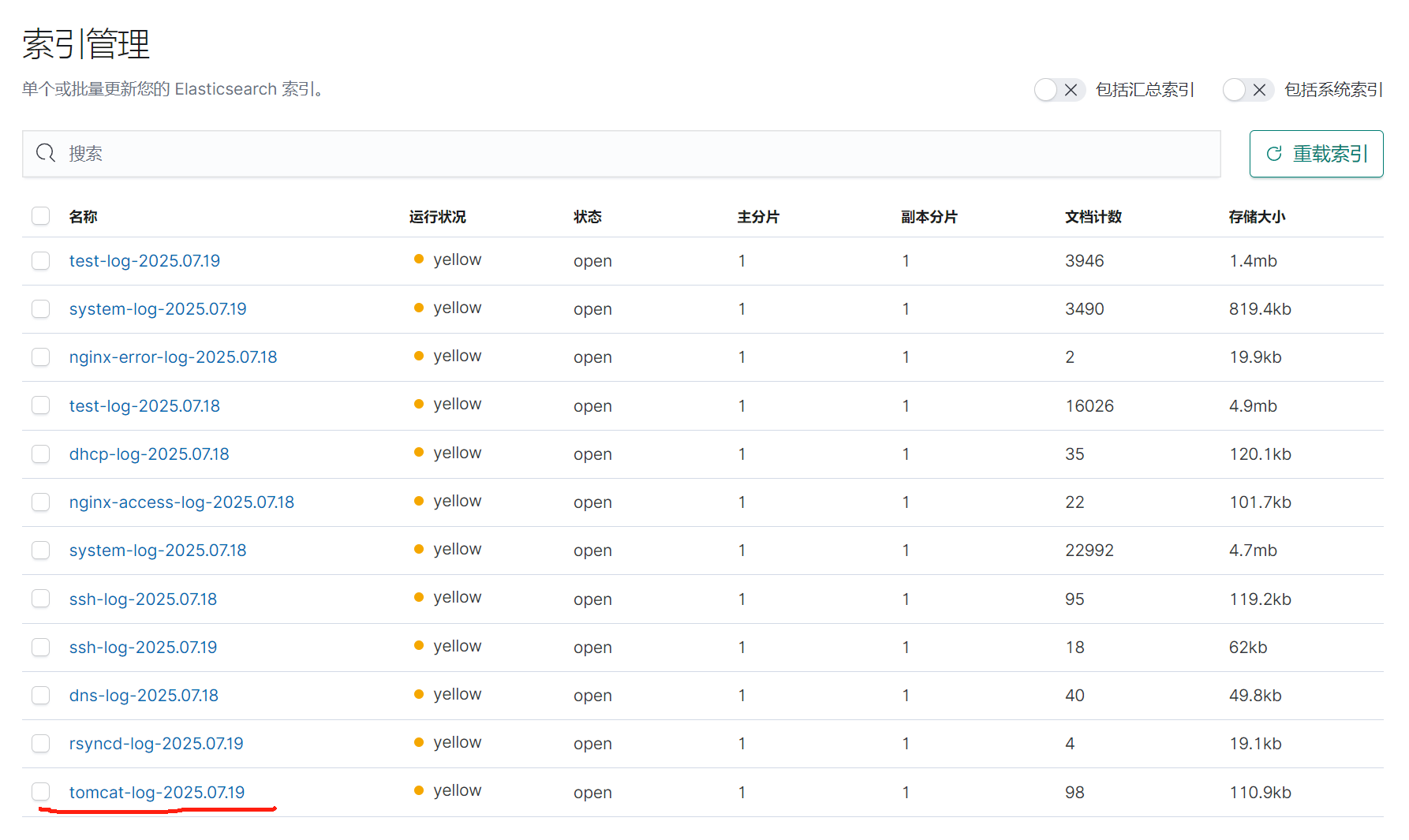

六.MySQL数据库日志收集
1.安装MySQL

2.编辑MySQL日志生成配置
编辑MySQL配置文件(/etc/my.cnf或/etc/mysql/mysql.conf.d/mysqld.cnf
[mysqld]
general_log = 1
general_log_file = /var/log/mysql/general.log
slow_query_log = 1
slow_query_log_file = /var/log/mysql/slow.log
long_query_time = 2 # 慢查询阈值(秒)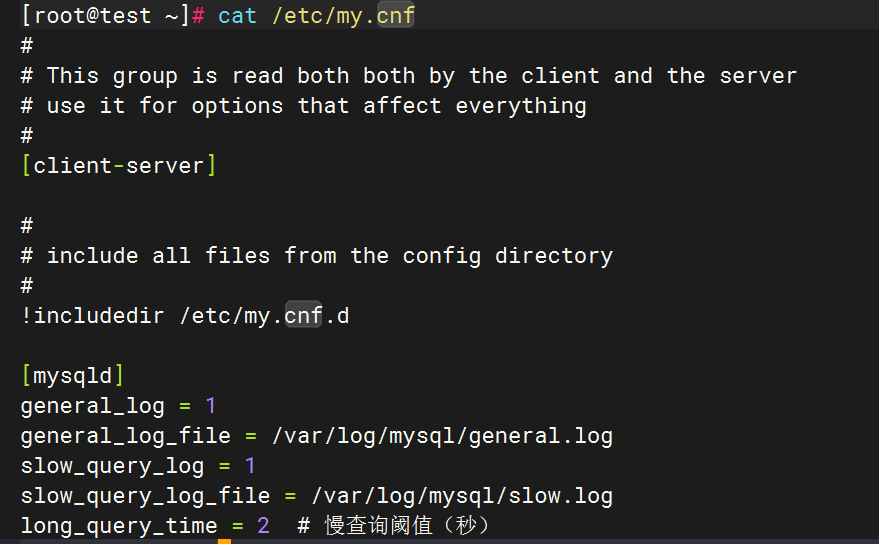
3.启动mysql并验证日志生成
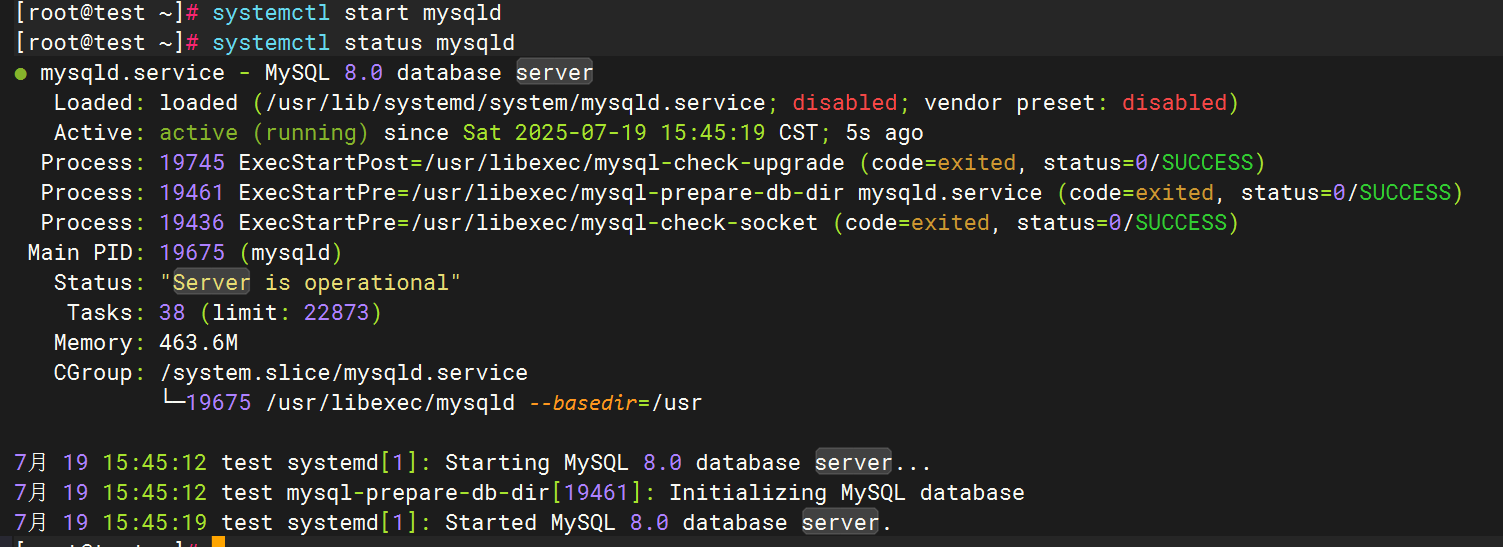
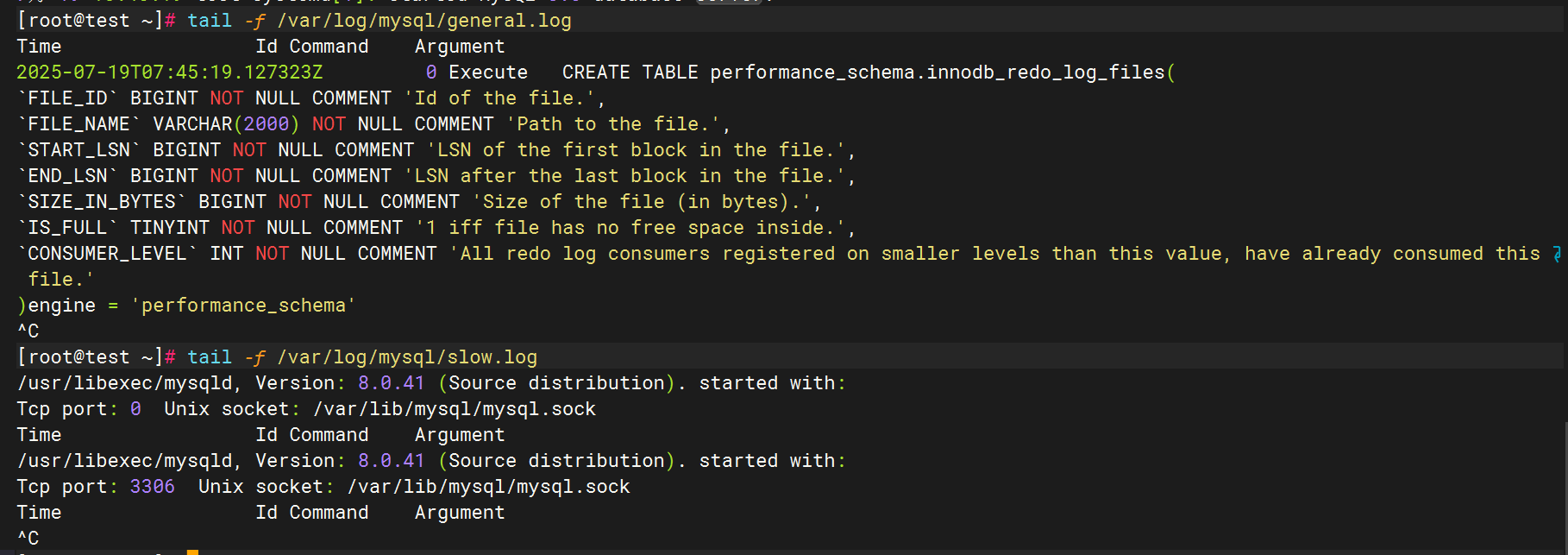
4.配置filebeat文件
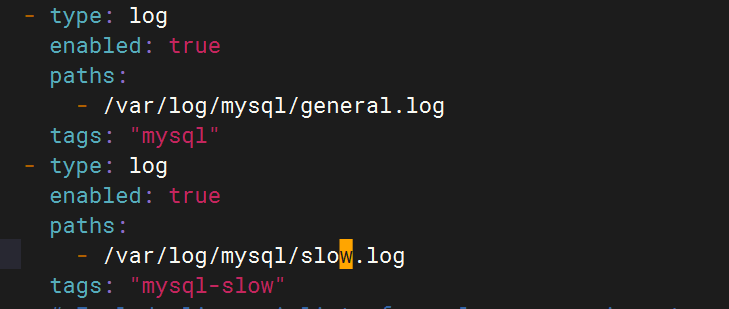
5.配置logstash文件
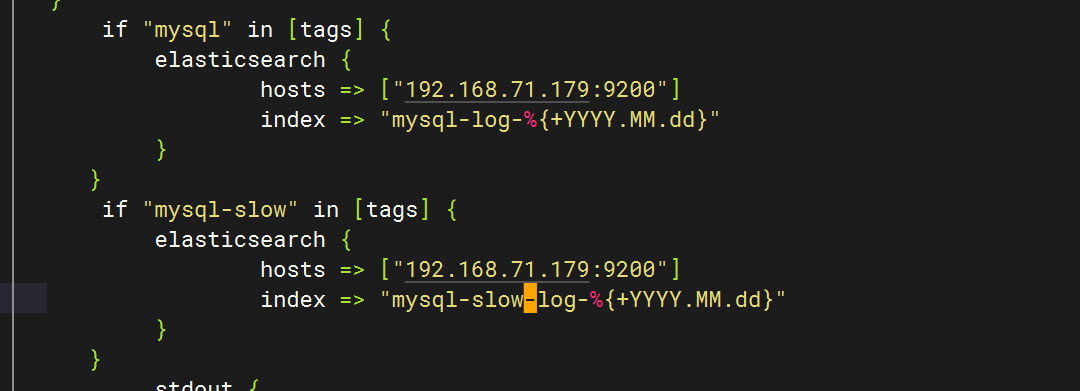
6.重启服务查看kibana
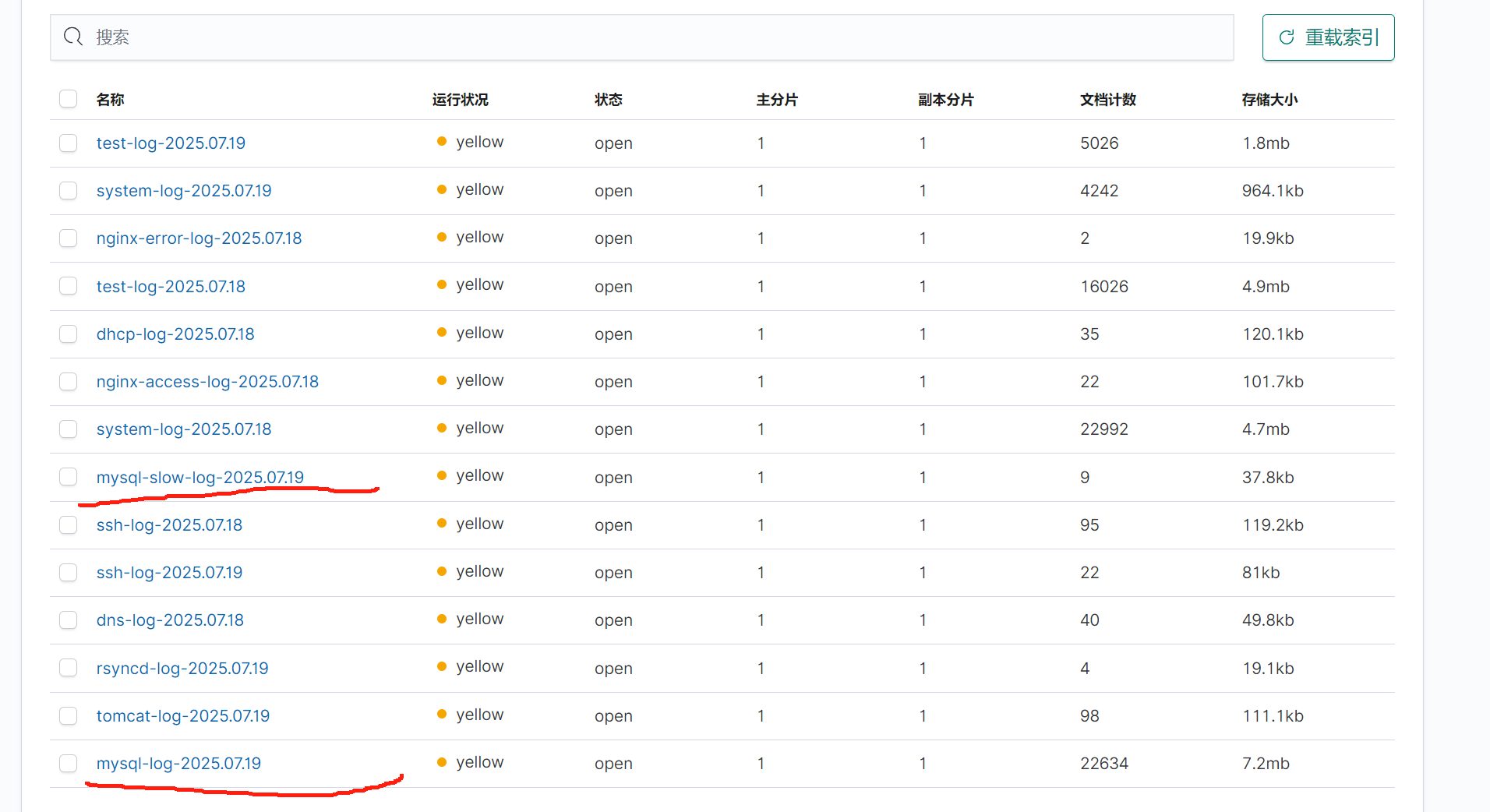
通用日志和慢日志
七.NFS日志收集
1.安装NFS

2.启用NFS日志
编辑NFS配置文件(通常为/etc/nfs.conf或/etc/sysconfig/nfs),确保日志模块启用并指定路径
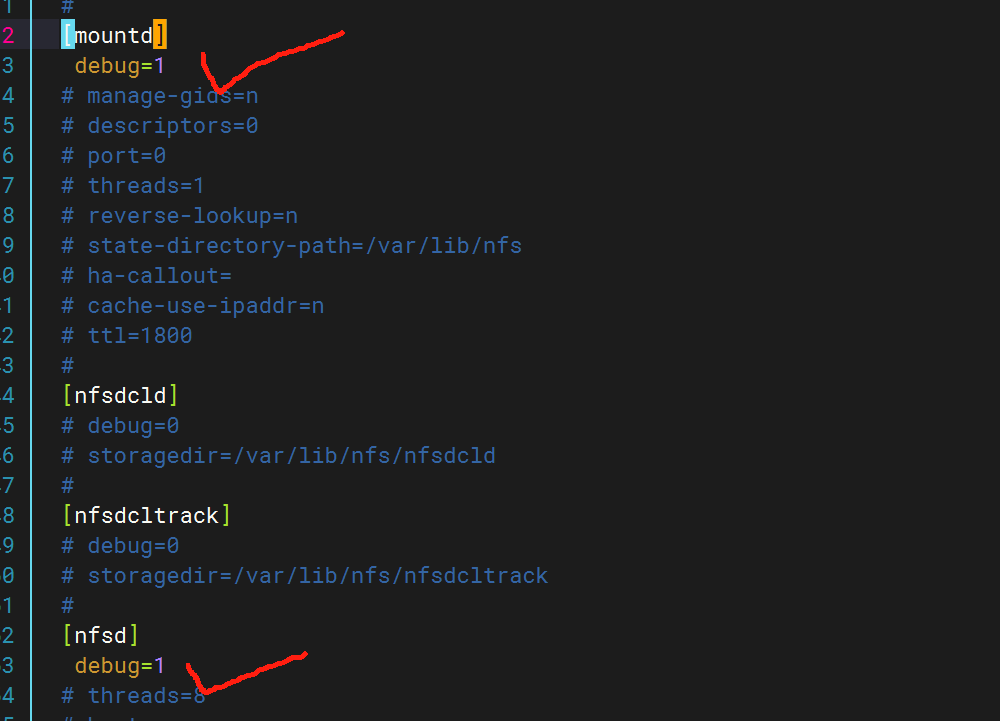
配置rsyslog.log文件,为nfs增加日志路径

创建日志文件

在NFS配置中指定facility

重启rsyslog服务

验证配置:
发送测试日志(使用local4 facility),检查日志是否生成

3.配置filebeat文件

4.配置logstash文件

5.重启服务查看kibana

八.Redis数据库日志收集
1.安装redis数据库

2.Redis日志生成配置
修改Redis配置文件
编辑/etc/redis.conf,启用日志并指定路径:

验证日志生成

3.配置filebeat文件

4.配置logstash文件

5.重启服务查看kibana

九.LVS日志收集
1.下载安装ipvsadm

2.配置rsyslog文件
在/etc/rsyslog.conf内加入
kern.* /var/log/lvs.log
手动触发LVS日志生成
通过模拟请求触发LVS转发,使系统产生日志:
curl http://<VIP> # 替换为你的虚拟IP(VIP)或在另一台机器访问VIP服务。
或者可以手动添加规则使日志内容增加
ifconfig ens34:0 192.168.71.200/24 #生成临时网址
ipvsadm -a -t 192.168.71.200:80 -s rr
ipvsadm -E -t 192.168.71.200:80 -s rr -p 60
ipvsadm -a -t 192.168.71.200:80 -r 192.168.1.101:80 -g
ipvsadm -a -t 192.168.71.200:80 -r 192.168.1.102:80 -g
查看日志内容是否生成

2.配置filebeat文件

3.配置logstash文件

4.重启服务后查看kibana

十.Haproxy日志收集
1.安装haproxy

2.配置haproxy文件
cat > /etc/haproxy/haproxy.cfg <<'EOF'
global
log 127.0.0.1 local0 info # 重要:使用local0设备
defaults
log global
mode http
option httplog
option dontlognull
timeout connect 5000
timeout client 50000
timeout server 50000
# 添加您的具体frontend/backend配置
# frontend示例:
frontend http-in
bind *:80
default_backend servers
backend servers
server server1 192.168.1.100:80 check
EOF3.配置Rsyslog收集HAProxy日志
创建文件 /etc/rsyslog.d/haproxy.conf
$ModLoad imudp
$UDPServerRun 514
local0.* /var/log/haproxy.log # 本地存储
local0.* @logstash_ip:5140 # 转发到Logstash4.修改filebeat文件

5.修改logstash文件

6.重启全部服务,登录kibana查看日志

十一.Keepalived日志收集
1.安装keepalived
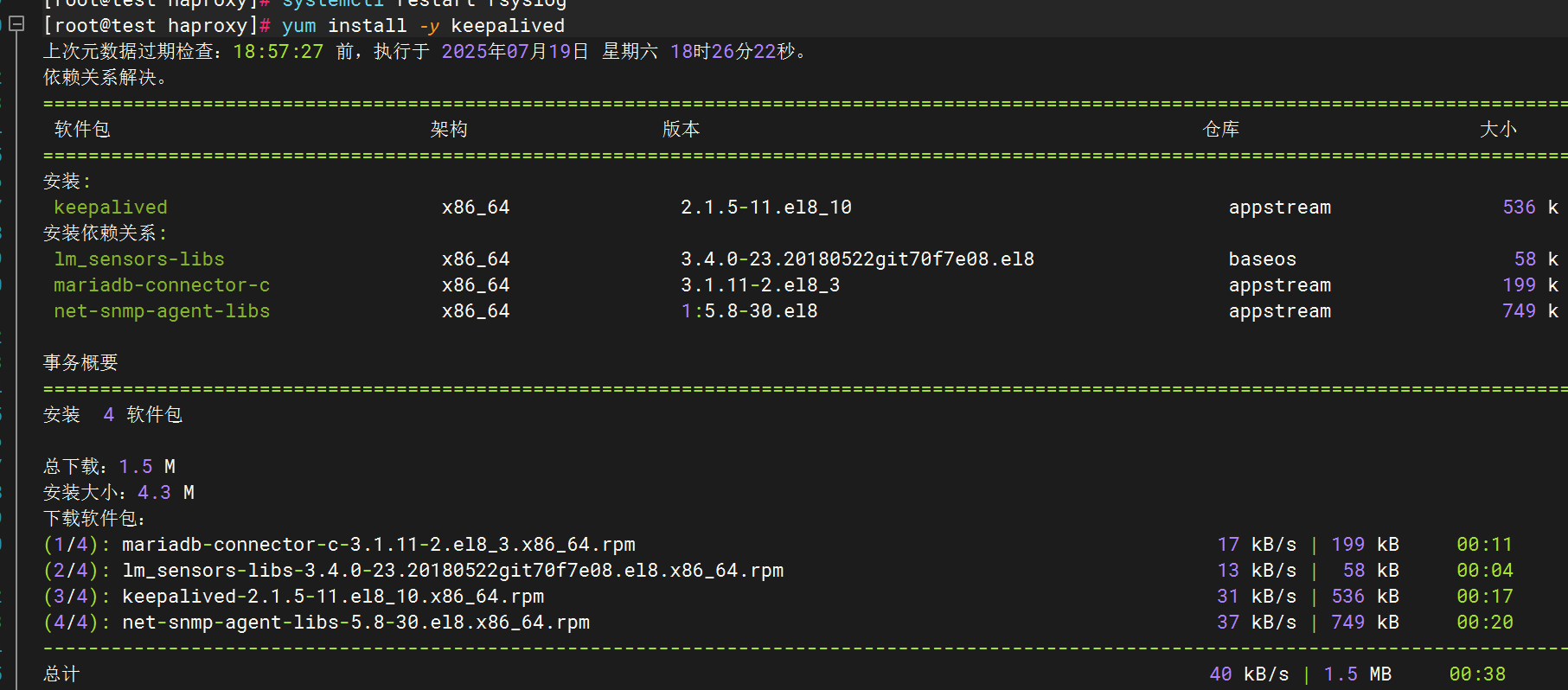
2.配置keepalived日志输出
创建日志目录
sudo mkdir -p /var/log/keepalived
sudo touch /var/log/keepalived/keepalived.log
sudo chown -R root:keepalived /var/log/keepalived
编辑keepalived配置文件,
vim /etc/sysconfig/keepalived添加以下行
KEEPALIVED_OPTIONS="-D -d -S 0"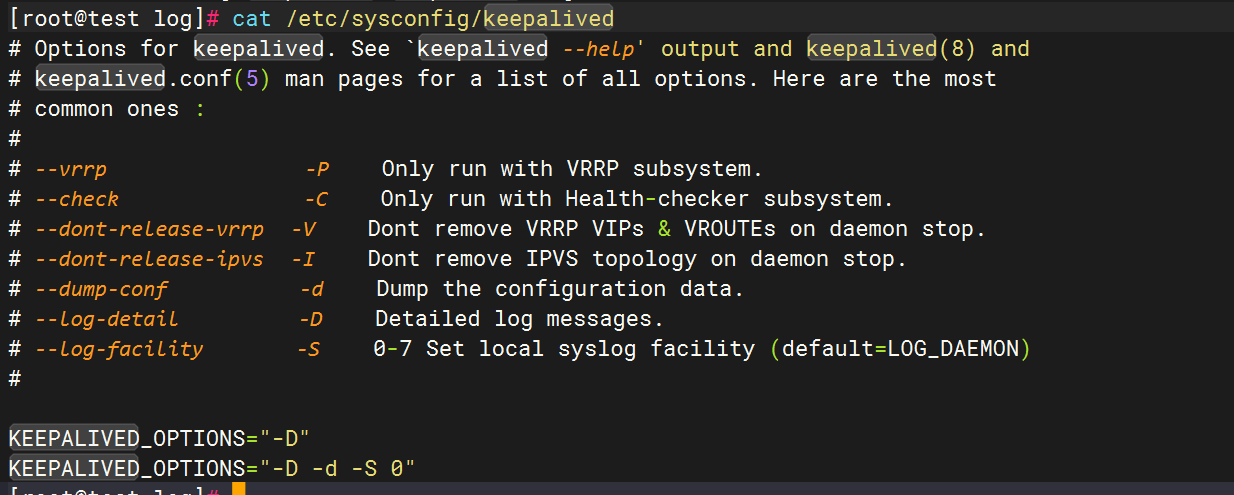
配置rsyslog,在文件末尾添加
local0.* /var/log/keepalived/keepalived.log
重启服务

3.测试日志生成

4.修改filebeat文件

5.修改logstash文件

6.重启全部服务,检查kibana

十二.汇总
logstash
经过全部配置后,logstash上的pipline.conf全部内容如下
input {
file {
path => "/var/log/messages"
start_position => "beginning"
}
beats {
port => 5044
}
}
filter {
if [host][name] {
mutate { add_field => { "hostname" => "%{[host][name]}" } }
}
else if [agent][hostname] {
mutate { add_field => { "hostname" => "%{[agent][hostname]}" } }
}
else {
mutate { add_field => { "hostname" => "%{host}" } }
}
}
output {
if [hostname] == "logstash" {
elasticsearch {
hosts => ["192.168.71.179:9200"]
index => "system-log-%{+YYYY.MM.dd}"
}
}
else if [hostname] == "test" {
if "system" in [tags] {
elasticsearch {
hosts => ["192.168.71.179:9200"]
index => "test-log-%{+YYYY.MM.dd}"
}
}
if "nginx-access" in [tags] {
elasticsearch {
hosts => ["192.168.71.179:9200"]
index => "nginx-access-log-%{+YYYY.MM.dd}"
}
}
if "nginx-error" in [tags] {
elasticsearch {
hosts => ["192.168.71.179:9200"]
index => "nginx-error-log-%{+YYYY.MM.dd}"
}
}
if "dhcp" in [tags] {
elasticsearch {
hosts => ["192.168.71.179:9200"]
index => "dhcp-log-%{+YYYY.MM.dd}"
}
}
if "dns" in [tags] {
elasticsearch {
hosts => ["192.168.71.179:9200"]
index => "dns-log-%{+YYYY.MM.dd}"
}
}
if "ssh" in [tags] {
elasticsearch {
hosts => ["192.168.71.179:9200"]
index => "ssh-log-%{+YYYY.MM.dd}"
}
}
if "rsyncd" in [tags] {
elasticsearch {
hosts => ["192.168.71.179:9200"]
index => "rsyncd-log-%{+YYYY.MM.dd}"
}
}
if "tomcat" in [tags] {
elasticsearch {
hosts => ["192.168.71.179:9200"]
index => "tomcat-log-%{+YYYY.MM.dd}"
}
}
}
if "mysql" in [tags] {
elasticsearch {
hosts => ["192.168.71.179:9200"]
index => "mysql-log-%{+YYYY.MM.dd}"
}
}
if "mysql-slow" in [tags] {
elasticsearch {
hosts => ["192.168.71.179:9200"]
index => "mysql-slow-log-%{+YYYY.MM.dd}"
}
}
if "nfs" in [tags] {
elasticsearch {
hosts => ["192.168.71.179:9200"]
index => "nfs-log-%{+YYYY.MM.dd}"
}
}
if "redis" in [tags] {
elasticsearch {
hosts => ["192.168.71.179:9200"]
index => "redis-log-%{+YYYY.MM.dd}"
}
}
if "lvs" in [tags] {
elasticsearch {
hosts => ["192.168.71.179:9200"]
index => "lvs-log-%{+YYYY.MM.dd}"
}
}
if "haproxy" in [tags] {
elasticsearch {
hosts => ["192.168.71.179:9200"]
index => "haproxy-log-%{+YYYY.MM.dd}"
}
}
if "keepalived" in [tags] {
elasticsearch {
hosts => ["192.168.71.179:9200"]
index => "keepalived-log-%{+YYYY.MM.dd}"
}
}
stdout {
codec => rubydebug
}
}filebeat
filebeat上的filebeat.yml内容如下
###################### Filebeat Configuration Example #########################
# This file is an example configuration file highlighting only the most common
# options. The filebeat.reference.yml file from the same directory contains all the
# supported options with more comments. You can use it as a reference.
#
# You can find the full configuration reference here:
# https://www.elastic.co/guide/en/beats/filebeat/index.html
# For more available modules and options, please see the filebeat.reference.yml sample
# configuration file.
#=========================== Filebeat inputs =============================
filebeat.inputs:
# Each - is an input. Most options can be set at the input level, so
# you can use different inputs for various configurations.
# Below are the input specific configurations.
- type: log
# Change to true to enable this input configuration.
enabled: true
# Paths that should be crawled and fetched. Glob based paths.
paths:
- /var/log/messages
#tags: "system"
#- c:\programdata\elasticsearch\logs\*
- type: log
enabled: true
paths:
- /var/log/nginx/access.log
tags: "nginx-access"
- type: log
enabled: true
paths:
- /var/log/nginx/error.log
tags: "nginx-error"
- type: log
enabled: true
paths:
- /var/log/dhcpd.log
tags: "dhcp"
- type: log
enabled: true
paths:
- /var/log/named/dns.log
tags: "dns"
- type: log
enabled: true
paths:
- /var/log/secure
tags: "ssh"
- type: log
enabled: true
paths:
- /var/log/rsyncd.log
tags: "rsyncd"
- type: log
enabled: true
paths:
- /usr/local/tomcat8/logs/*.log
tags: "tomcat"
- type: log
enabled: true
paths:
- /var/log/mysql/general.log
tags: "mysql"
- type: log
enabled: true
paths:
- /var/log/mysql/slow.log
tags: "mysql-slow"
- type: log
enabled: true
paths:
- /var/log/nfs.log
tags: "nfs"
- type: log
enabled: true
paths:
- /var/log/redis/redis.log
tags: "redis"
- type: log
enabled: true
paths:
- /var/log/lvs.log
tags: "lvs"
- type: log
enabled: true
paths:
- /var/log/haproxy.log
tags: "haproxy"
- type: log
enabled: true
paths:
- /var/log/keepalived/keepalived.log
tags: "keepalived"
# Exclude lines. A list of regular expressions to match. It drops the lines that are
# matching any regular expression from the list.
#exclude_lines: ['^DBG']
# Include lines. A list of regular expressions to match. It exports the lines that are
# matching any regular expression from the list.
#include_lines: ['^ERR', '^WARN']
# Exclude files. A list of regular expressions to match. Filebeat drops the files that
# are matching any regular expression from the list. By default, no files are dropped.
#exclude_files: ['.gz$']
# Optional additional fields. These fields can be freely picked
# to add additional information to the crawled log files for filtering
#fields:
# level: debug
# review: 1
### Multiline options
# Multiline can be used for log messages spanning multiple lines. This is common
# for Java Stack Traces or C-Line Continuation
# The regexp Pattern that has to be matched. The example pattern matches all lines starting with [
#multiline.pattern: ^\[
# Defines if the pattern set under pattern should be negated or not. Default is false.
#multiline.negate: false
# Match can be set to "after" or "before". It is used to define if lines should be append to a pattern
# that was (not) matched before or after or as long as a pattern is not matched based on negate.
# Note: After is the equivalent to previous and before is the equivalent to to next in Logstash
#multiline.match: after
#============================= Filebeat modules ===============================
filebeat.config.modules:
# Glob pattern for configuration loading
path: ${path.config}/modules.d/*.yml
# Set to true to enable config reloading
reload.enabled: false
# Period on which files under path should be checked for changes
#reload.period: 10s
#==================== Elasticsearch template setting ==========================
setup.template.settings:
index.number_of_shards: 1
#index.codec: best_compression
#_source.enabled: false
#================================ General =====================================
# The name of the shipper that publishes the network data. It can be used to group
# all the transactions sent by a single shipper in the web interface.
#name:
# The tags of the shipper are included in their own field with each
# transaction published.
#tags: ["service-X", "web-tier"]
# Optional fields that you can specify to add additional information to the
# output.
#fields:
# env: staging
#============================== Dashboards =====================================
# These settings control loading the sample dashboards to the Kibana index. Loading
# the dashboards is disabled by default and can be enabled either by setting the
# options here or by using the `setup` command.
#setup.dashboards.enabled: false
# The URL from where to download the dashboards archive. By default this URL
# has a value which is computed based on the Beat name and version. For released
# versions, this URL points to the dashboard archive on the artifacts.elastic.co
# website.
#setup.dashboards.url:
#============================== Kibana =====================================
# Starting with Beats version 6.0.0, the dashboards are loaded via the Kibana API.
# This requires a Kibana endpoint configuration.
setup.kibana:
# Kibana Host
# Scheme and port can be left out and will be set to the default (http and 5601)
# In case you specify and additional path, the scheme is required: http://localhost:5601/path
# IPv6 addresses should always be defined as: https://[2001:db8::1]:5601
#host: "localhost:5601"
# Kibana Space ID
# ID of the Kibana Space into which the dashboards should be loaded. By default,
# the Default Space will be used.
#space.id:
#============================= Elastic Cloud ==================================
# These settings simplify using filebeat with the Elastic Cloud (https://cloud.elastic.co/).
# The cloud.id setting overwrites the `output.elasticsearch.hosts` and
# `setup.kibana.host` options.
# You can find the `cloud.id` in the Elastic Cloud web UI.
#cloud.id:
# The cloud.auth setting overwrites the `output.elasticsearch.username` and
# `output.elasticsearch.password` settings. The format is `<user>:<pass>`.
#cloud.auth:
#================================ Outputs =====================================
# Configure what output to use when sending the data collected by the beat.
#-------------------------- Elasticsearch output ------------------------------
#output.elasticsearch:
# # Array of hosts to connect to.
# # hosts: ["localhost:9200"]
# hosts: ["192.168.71.179:9200"]
# indices:
# - index: "LVS-logs"
# when:
# contains:
# { "message": "ipvs"}
#setup.ilm.enabled: false
#setup.template.name: "LVS"
#setup.template.pattern: "LVS-*"
# Optional protocol and basic auth credentials.
#protocol: "https"
#username: "elastic"
#password: "changeme"
#----------------------------- Logstash output --------------------------------
output.logstash:
# The Logstash hosts
hosts: ["192.168.71.180:5044"]
# Optional SSL. By default is off.
# List of root certificates for HTTPS server verifications
#ssl.certificate_authorities: ["/etc/pki/root/ca.pem"]
# Certificate for SSL client authentication
#ssl.certificate: "/etc/pki/client/cert.pem"
# Client Certificate Key
#ssl.key: "/etc/pki/client/cert.key"
#================================ Processors =====================================
# Configure processors to enhance or manipulate events generated by the beat.
processors:
- add_host_metadata: ~
- add_cloud_metadata: ~
#================================ Logging =====================================
# Sets log level. The default log level is info.
# Available log levels are: error, warning, info, debug
#logging.level: debug
# At debug level, you can selectively enable logging only for some components.
# To enable all selectors use ["*"]. Examples of other selectors are "beat",
# "publish", "service".
#logging.selectors: ["*"]
#============================== Xpack Monitoring ===============================
# filebeat can export internal metrics to a central Elasticsearch monitoring
# cluster. This requires xpack monitoring to be enabled in Elasticsearch. The
# reporting is disabled by default.
# Set to true to enable the monitoring reporter.
#xpack.monitoring.enabled: false
# Uncomment to send the metrics to Elasticsearch. Most settings from the
# Elasticsearch output are accepted here as well. Any setting that is not set is
# automatically inherited from the Elasticsearch output configuration, so if you
# have the Elasticsearch output configured, you can simply uncomment the
# following line.
#xpack.monitoring.elasticsearch:
#================================= Migration ==================================
# This allows to enable 6.7 migration aliases
#migration.6_to_7.enabled: truekibana
kibana总览
